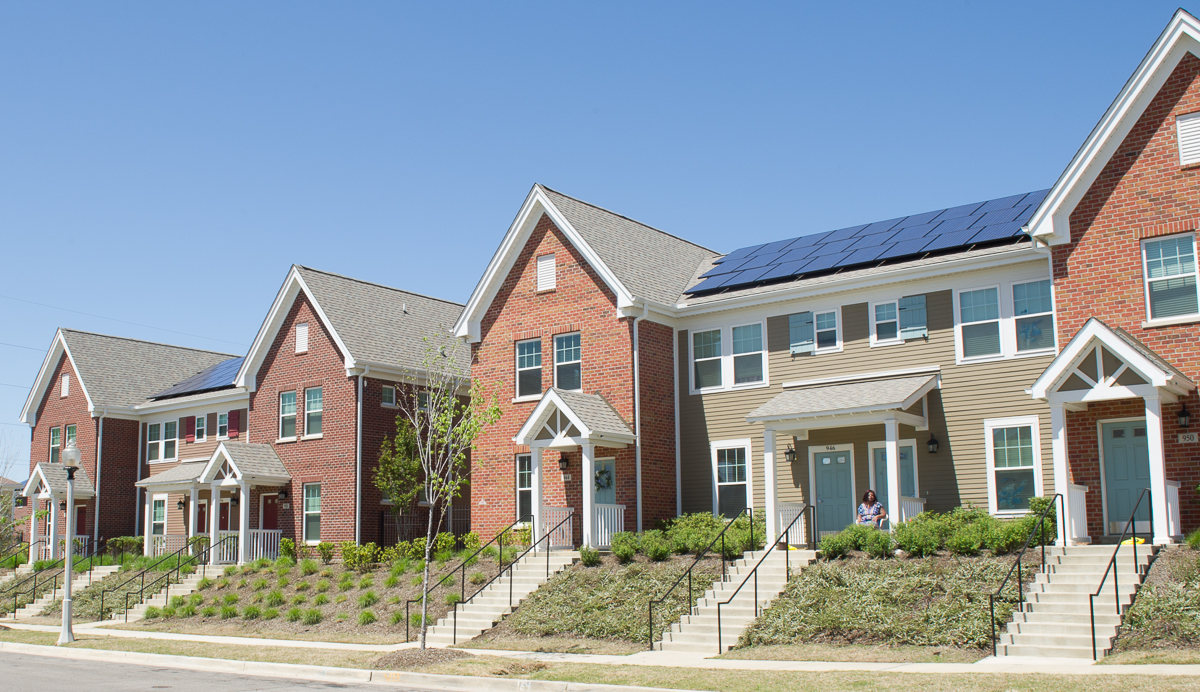It is no news that carrying out real estate projects require a lot of funds to finance them. This common issue has led to abandoned projects and unfulfilled promises by some real estate developers.
What happens as an estate developer when you spot investment areas with great potential but have insufficient funds to finance the project?
Or do you have mega ideas that can change the housing sector and write your name amongst stars, but no capital to run the vision? Do you abandon the ship or do you seek other ways to finance your ideas?
NHF Real Estate Development Loan is a scheme under the National Housing Fund set up to assist Real Estate Developers in obtaining low-interest loans to finance residential housing projects. Usually preferred by estate developers with one or two complete projects under their belt
Everything you need to learn about the NHF real estate development loan is detailed in this article. You’ll be learning all about the NHF Real Estate Development Loan, the criteria, the requirements, and how to benefit from the NHF Real Estate Development loan.
- What is the NHF Real Estate Development Loan?
- Who Can Apply?
- Product Features of the NHF Real Estate Development Loan
- Eligibility Criteria
- Documents Necessary To Apply For The NHF Real Estate Developers Loan
- Benefits
- Risks
- Developers With Lease Agreement Requirements
- How do I register with the National Housing Fund (NHF)?
- Frequently Asked Questions
- Final Thoughts
What is the NHF Real Estate Development Loan?

The NHF Real Estate Development Loan is a product under the National Housing Fund (NHF) designed for private developers, State housing corporations, and housing co-operatives to bridge the mass deficit housing issue in Nigeria.
They do this by mass-producing houses for ownership by NHF contributors. The loan facility is at 10% interest for 24 months (2 years).
The scheme is handled by the Mass Housing Scheme (MHS) in collaboration with the Federal Mortgage Bank of Nigeria (FMBN).
The general policy of the loan is, housing units must not exceed N15 million and must be sold to only NHF contributors. Also, the loan is available for residential housing projects only.
It is easier for experienced developers to access the loans. Usually, because they have a track record of already completed projects to build trust and competency.
How Does It Work?
The NHF Real Estate Development Loan works when an estate developer sights an investment opportunity, then properly outlines the necessary requirements and possible steps for the proposed project’s completion.
The estate developer draws out a solid plan and presents it to an FBMN-accredited primary mortgage bank along with the requisite documents.
Nigeria has a population of over 218,541,212 million people with the majority of the population centered in urban areas. This has led to constant pressure on housing to meet up with demands in these urban areas.
There is a higher percentage of upper to lower-middle-class Nigerians, and this category is a smart target area for developers. The good thing about it is, well-constructed estates in urban areas are in high demand.
As a real estate developer, bridging this gap is the fastest way to turn a profit.
How Much Is The Loan
The NHF Real Estate Development loan amount is a minimum of N50 million and above. The amount you can access depends on your collateral, track record, or financial statement.
How Long Is The Loan For
The tenure of the loan is 2 years. At an interest rate of 10% annually.
Who Can Apply?
To qualify for the NHF Real Estate Development Loan, the applicant must be an NHF contributor.
A registered Estate Developer with a recognized body, for example the Real Estate Development Association of Nigeria (REDAN).
Cooperative societies can obtain estate construction loans to build houses for their members.
Product Features of the NHF Real Estate Development Loan
The characteristics of the NHF Real Estate Development Loan include:
The NHF Real Estate Development loan is for residential housing estates only. The scale of the project is dependent on the developer’s choice. You can build a mini estate or a full-on estate.
For private developers, the NHF Real Estate Development Loan finances 70% of the total cost of the project. The private developer has to put an equity of 30% down payment.
If you have just 30% of the total money needed for the project, the bank helps you pay for the remaining 70% cost.
For government-owned development projects and housing corporations, the loan finances 100% of the total cost, you can contact: Info@fmbn.gov.NG
Eligibility Criteria
The eligibility criteria state what you need to qualify for the NHF Estate Developers Loan.
To qualify for an Estate Development Loan from the bank, an estate developer must meet the following conditions.
The loan is for residential housing projects only. The proposed estate must have a good title that can be assigned, leased, or subleased to individual allottees/purchasers of the units therein.
Housing units under the proposed project must not be more than N15 million so that they can be affordable to NHF contributors. Each building constructed must be in line with the plans specified by the Federal Mortgage Bank of Nigeria (FMBN).
Also read: NHF Rent-to-Own, An Alternative Way To Own A House In 2023
There must have been firm commitments from buyers to buy the housing units. An accredited mortgage loan originator (Primary Mortgage Bank) should be onboard in order to facilitate the introduction of the project to prospective buyers who must be contributors to the National Housing Fund (NHF).
The primary Mortgage Bank must then forward a letter indicating the marketing plan for the housing units.
A financial projection to suit the proposed financial arrangement for the project must be provided by the developer.
The project must include the developer’s equity participation (30%) in the project at the present rate of 10% interest.
Estate Development loans are to be secured with the title document (e.g. C of O or R of O) for the property to be developed.
Documents Necessary To Apply For The NHF Real Estate Developers Loan

The following documents are what you’ll need. They should be submitted with the loan application to the nearest FMBN-approved bank.
- Certificate of incorporation
- Photocopy of Article and Memorandum of association of the company with certified true copies of FORM C02 and FORM C07.
- Detailed profile of the company(list of board of directors, names, profession, and position in tabular form, list of the shareholding profile of the board of directors, technical teams, etc.)
- An audited annual account with the signature, seal, and certification stamp of the auditor for the previous three years.
- Photocopy of tax clearance certificate for three years.
- Photocopy of the registered titled document on the land for the proposed project.
- Approved building layout plan by the relevant authority.
- The company’s board resolution to borrow, signed by the Chairman and Company Secretary.
- Detailed budget, cost, and sources of funds for the estate infrastructure and amenities.
- Letter of marketing commitment from an accredited Mortgage Loan Originator (i.e. Primary Mortgage Bank).
- Evidence of registration with the National Housing Fund (NHF) and up-to-date remittance of employees’ contributions to the fund.
- Payment of N20,000 non-refundable application fee for amounts below N50 million. And a multiple of N20,000 for every amount of more than N50 million.
- Payment of a non-refundable search fee of N60,000.
- Evidence of membership in the Real Estate Development Association of Nigeria (REDAN), and up-to-date subscription.
- A viable facility management plan for the proposed estate and program for its sustainability.
- Valuation report signed by a registered Estate Valuer on the proposed project.
- Price Bill of Quantity (BOQ) signed by a registered Quantity Surveyor.
- Feasibility and viability development report.
- Resolution of the state executive council as well as motion of the State House of Assembly approving the application for a loan from FMBN for State Housing Corporations.(not for private developers).
- The developer must be accredited by the risk management unit of the bank with a non-refundable fee of N250,000.
- Any other relevant information that may facilitate quick consideration of the loan (detailed list of projects executed by the developer). Collateral for the loan and how to repay
Collateral are securities for a loan, owned by the borrower and kept in trust by the lender till the full loan amount is repaid by the borrower.
In cases where the borrower is unable to repay the loan, the collateral is taken and sold off to recover the loan amount.
Also read: 10 Must-Have Important Property Document In Nigeria
The collateral required for the NHF real estate development loan is the property itself.
Benefits
- The interest rate is lower and more stable than commercial loans
- Developers enjoy 70% to 100% funding on real estate projects
Risks
The major risks to the NHF Real Estate Development Loan is not being able to execute the project within the stipulated time, defaulting on loan repayment which can cause the bank to reclaim the property, and also not getting enough home buyers/subscribers to recoup costs
Developers With Lease Agreement Requirements

A lease agreement is an agreement between two parties. One a lessee and the other a lessor. Allowing the lessee to use the property (asset) for a specified period of time in exchange for a payment. The agreement states the full details of the transactions in the interest of both parties.
The most common lease agreement in Nigeria for estate developers is the family property and joint venture development lease.
Developers with Lease Agreements are to meet the following requirements:
- The lease agreement on the land must show the land as registerable as well as give the developer power to layout, partition, allocate, assign and sublet housing units. These housing units include apartments, blocks of flats, detached and semi-detached bungalows, terraces, duplexes, etc. As well as service plots. This must be done in accordance with the approved building plan/ site layout.
- The estate development lease should state that the individual titles will be submitted directly to FMBN (or the financier).
- That the developer will be able to pledge and mortgage the land/ development to FMBN or any other financier there to raise funds to meet the obligation under the development lease agreement.
- The tenure of the lease should be for a minimum of 5 years with an assurance of renewal for a further term of 5 years or more.
- The financier of FMBN should have first charge over the land/ development on it.
How do I register with the National Housing Fund (NHF)?
- Visit any approved Primary Mortgage Bank (PMB) and open a savings account. Or visit their website and fill out the FHA mortgage Online forms.
- Use NHF employer 1 (employer) and NHF employer 2 (employee) forms to register, you’ll be given a passbook.
- Remit monthly contributions to FMBN for up to 6 months.
- Employers must update the passbook which is transferable from one job to the next
Or you can do this too.
- Employers receive an Employers Registration Form (NHF1) from the FMBN
- Employers will fill out the NHF1 form and return it to FMBN’s nearest branch.
- The FMBN registers the Employer and assigns to them an Employer Registration Number.
- The FMBN provides (NHF2) form 2 to the employers for their employees. For self-employed persons, fill out form 1 and form 2.
- Employees fill out the NHF 2 forms and return them to their company, for self-employed candidates, they return form 2 to FMBN.
- The FMBN registers all employees and assigns them individual participation numbers.
- The FMBN provides a cash book to the employers for themselves and their employees to keep a record of the deductible 2.5% contribution fund.
- Employers deduct 2.5% from their employee’s salaries, and the employer submits the deduction records to FMBN. Employers (self-employed or otherwise) remit the funds directly to FMBN.
- The FMBN provides payment receipts in return.
- With this, the employees and employers are considered registered participants of the NHF.
Frequently Asked Questions
What is the maximum loan amount that can be gotten from NHF?
The maximum amount for NHF loans is 15 Million (NGN). Although your bank may advise you to take a smaller amount. However, the NHF doesn’t give anyone loans for more than 90% of the mortgaged property. You must have the remaining 10% yourself.
What is the tenure of the NHF loan?
Maximum of 30 years, however, you can decide to pay within a shorter time frame if you can afford to.
What happens when an NHF contributor dies without obtaining the loan?
If an NHF contributor dies without taking an FHA loan, the accumulated money paid in their lifetime is refunded to their next of kin with interest once the necessary documents are provided.
How can I check my NHF balance?
Any NHF contributor who has registered their number with FMBN can quickly check their NHF balance or the status of their contributions through these steps:
Step 1: Dial *219# and send.
Step 2: Type 2 and send.
Step 3: Type 1 and send.
Step 4: Type the month you want to check(Jan-dec, 1 to 12).
Note: If the FMBN has reconciled your monthly contributions, your balance would appear on the screen after Step 4. But if it hasn’t it would not appear, Contact the nearest FMBN office for assistance.
Are there loan options for people who are business owners and not salary earners?
Yes. There are available loans and this category is the self-employed or commercial mortgage. Although, the loan tenure is shorter and the interest rates are slightly higher.
Final Thoughts
The process might seem overwhelming but everything good requires a bit of hard work. As an estate developer or an aspiring developer, getting the documents handy should be your first step to securing the loan.
What makes the NHF Estate Developers Loan stand out is its interest rate. Which is relatively low and more stable when compared to commercial loans which have high-interest rates of 25% to 35%.
To keep abreast of real estate trends and helpful information, be sure to check out other articles on Realty Nub.



